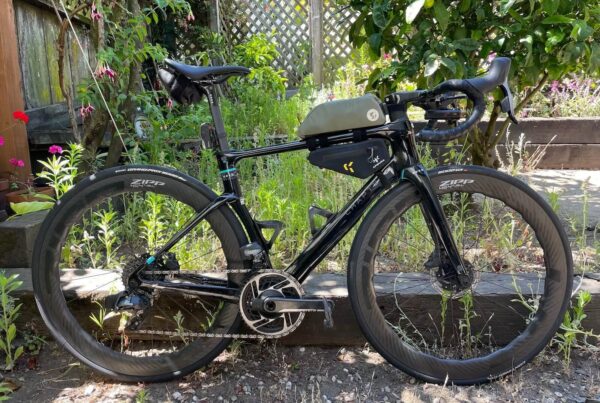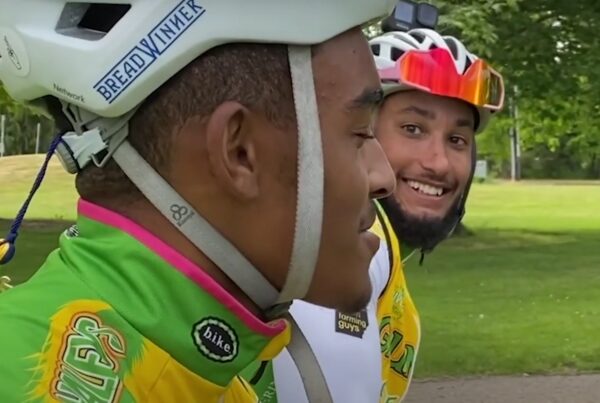Even if you know you did nothing wrong, follow instructions from police if you’re stopped while cycling—it will work in your favor in the long run.
By Bob Mionske
Eighteen months ago, my column on the Commuter Tax Benefit marked the start of my then-new blog, Road Rights (and 18 months later, Road Rights still feels like my “new blog”). Writing about tax benefits was something new for me, but people wanted to know more about this new benefit, so it seemed like a good way to start the blog.
Still, this was a bit of a change compared to my long-time interest in cyclists’ rights and my legal practice, which has focused exclusively on representing injured cyclists. But my next blog column,When The Cop Says Stop, dove headfirst into the issue of cyclists’ rights, with a shocking report on the violent confrontation between a Sheriff’s Deputy and two cyclists in southern Ohio. While I expected that the subject matter would be perhaps somewhat more controversial than tax benefits, I did not expect the storm that erupted almost immediately, with many people misunderstanding the column to mean that I was advocating that cyclists disregard orders from law enforcement officers. Bicycling even ran a “counter-point” response from a Tallahassee police officer.
In fact, I urged cyclists to stop when ordered to stop, and if they disagreed with the officer’s interpretation of the law, to argue about it later, in court. And this is still my message; in “Keep Your Cool,” my Road Rights column for the September issue of Bicycling, I argued this point. And it, too, is generating some controversy.
Thus, what began as my first foray into discussing our rights on the road in this blog still reverberates today, with people still weighing in some 18 months later.
But what about Tony Patrick, the cyclist who was beaten, tasered and arrested, and his riding companion “Ryan”—the two cyclists at the heart of this story? Since this story first ran, I’ve received many emails asking about the outcome of this incident.
Before I get to that, though, let me recap what happened for those who might have missed this incident the first time around. ((On August 19, 2008, two cyclists, separated from a larger group regularly riding out of Huntington, West Virginia, were riding through Chesapeake, Ohio, on their way back to Huntington, on the other side of the Ohio River. As they were entering the outskirts of Chesapeake, a Lawrence County Sheriff’s Deputy pulled alongside the two cyclists. According to the cyclists, the Sheriff’s Deputy said, “You guys shouldn’t be riding in the road,” and Patrick replied, “We have as much right to be in the road as you do.” According to the Sheriff’s Deputy, he passed them and pulled into the parking lot of the library, got out his of his cruiser, and asked the cyclists to stop, because they had been riding two abreast and were impeding traffic; he reported that Patrick replied, “I have got as much right to the road as anyone else.”
This diverging accounts of the cyclists’ and the Deputy were not limited to this initial exchange. Instead, each side recalled events differently from beginning to end. Nobody disagrees on the outcome, however: the cyclists continued to ride, until the Deputy pulled ahead, and blocked their path. The Deputy tasered Patrick, and attempted to subdue him with his baton. Chesapeake police arrived to back up the Deputy, and Patrick was tasered again, placed in handcuffs, and arrested. His riding companion, a minor I called “Ryan” (to protect his privacy), was also handcuffed and arrested.
Criminal charges were filed, including “Riding a Bicycle on the Roadway,” resisting arrest, and failure to obey a lawful order. However, Matt Vital, the attorney defending Patrick on his criminal charges, filed a Motion to Dismiss the charges (“Ryan” was being charged as a delinquent juvenile, and was defended by Charles Gould). At the hearing on the motion, the court ruled that the Deputy’s initial order to stop was unlawful; therefore, the two cyclists could not be charged with failure to obey an order and resisting arrest. And of course, the “Riding a Bicycle in the Roadway” charge was so ridiculous that it never made it past the prosecutor. After this ruling, the prosecutor dismissed all charges against the two cyclists.
“Ryan” returned to his life as a student, and has had nothing more to do with the legal issues arising from this incident. However, Tony Patrick, the cyclist who was beaten and tasered, filed a civil suit against Lawrence County Deputy Charles Hammonds, Lawrence County Sheriff Jeffrey Lawless, Chesapeake Police Officer Steve Gibson, Chesapeake Chief of Police Russell Bennett, and the City of Chesapeake. This suit, Patrick v. Lawless, et al., was filed on August 19, 2009, exactly one year after the incident. Patrick’s allegations included claims of excessive force, negligence, assault and battery, false arrest, and false imprisonment. His attorney on the civil trial was Ohio bike lawyer (and contributor to my book Bicycling & the Law) Steve Magas.
During discovery for the civil suit, Magas sent a Freedom of Information Act request to the Lawrence County Sheriff and the City of Chesapeake; the attorney for Chesapeake replied by providing some of the requested materials, but noted in a letter that “there’s no videotape” of the incident. Because there was so much disagreement between the differing accounts of what had transpired between the two cyclists and law enforcement, a videotape might have helped provide some objective clarity.
Then, incredibly, during the deposition of Officer Gibson, Magas learned that there was a videotape from Officer Gibson’s “cruiser cam,” that it had been recording the entire time Officer Gibson was present, and that Officer Gibson had told Chief Bennett about the tape afterward. Chief Bennett removed the tape from the cruiser cam (he was the only officer authorized to do so). Officer Gibson testified that he had looked at the tape after it was removed from his cruiser, but it hadn’t recorded the fracas because of the angle his cruiser had been parked at.
Officer Gibson believed that after Chief Bennett removed the tape, he placed it into the Chief’s “evidence closet”; the Chief was the only person with a key to this closet, and there was no record of what was in the closet. To make matters more complicated, in November of 2008, a new Mayor had been elected in Chesapeake, and Chief Bennett eventually stepped down, to be replaced by none other than Officer Gibson.
Even if now-Chief Gibson’s assertion that there was nothing on the tape was true, this was a shocking revelation, because the tape—indeed, the tape’s very existence—had been illegally withheld from Magas and the criminal defense attorneys, despite discovery requests specifically asking for the tape. Following the revelations made in Gibson’s deposition, the defendants in the civil suit threw in the towel and decided to settle. Last month, Patrick reached a settlement agreement with the defendants, and although the settlement terms are confidential, Tony Patrick was reported to be “very pleased with the outcome, and feels that justice was done.”
Is there anything we can learn from this incident?
I think so. For cyclists, the confrontation, tasering and arrest serve as an important reminder that even if you believe that you are in the right, serious consequences may arise if an officer believes that you are disregarding his attempts to get you to stop. This doesn’t mean you’ve violated the law; it may mean the officer is misinformed about the law, as was the case in Ohio. But however misinformed the officer may be, there is simply no reason to refuse an officer’s request for you to stop.
Once you do pull over, officers will often ask you if you know why you are being stopped; this is how they get people to admit that they’ve broken laws. So it’s always best to respond that, no, you don’t know why you were pulled aside.
There are a lot of upsides to being courteous with the police. Even if you have broken a law, the officer may only intend to give you a warning; treating the officer discourteously may only convince the officer to give you a ticket. And if you do get a ticket, the proper forum for disputing the citation is the courtroom, not the side of the road. Also, if the officer believes you’ve violated the law, remember that anything you say to the officer now can and will be repeated later in court, so keep your arguments focused on the legal points, and save them for the courtroom, where they might actually count for something.
But what if you’re in a situation like Tony Patrick, where you believe that you haven’t broken any laws, but the officer believes that you have?
If you want to explain to the officer that state law allows you to ride there, you can give that a try, if the officer is willing to listen (but be sure that you know local law—which must be consistent with state law—as well). Remember, the officer is under no obligation to stand there and listen to your legal arguments, even if you believe the officer is wrong.
Lecturing the officer? When was the last time you won a heated political argument? Even a polite disagreement rarely results in convincing an adult he or she is dead wrong.
In the end, if the officer insists that you are breaking the law, and if you know for a fact that you are not breaking the law, your only roadside options will be to comply with what the officer is telling you, or to accept a citation and dispute the officer’s interpretation of the law in the proper forum, which is a courtroom.
Connect with Bob on Facebook!
(Research and drafting provided by Rick Bernardi, J.D.)
This column, Listen, Obey–and then Act, originally appeared on Bicycling on September 10, 2010.



